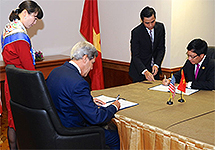Miles Pomper
May 9, 2014

US-Vietnam sign nuclear fuel agreement, WikiMedia Commons
On May 8, the Obama Administration officially submitted an agreement for civilian nuclear cooperation with Vietnam to the Congress for its review. While the deal is not everything nonproliferation supporters might have hoped for, it represents a small advance for efforts to halt the spread of nuclear weapons. Most of all, it is an improvement over a situation without an agreement – where the US would have no role in shaping Vietnam’s nuclear future.
The value of the agreement for many centers on whether it affects Vietnam’s ability to domestically enrich uranium or reprocessing spent nuclear fuel—technologies that can be used both to produce fuel for nuclear power plants or for nuclear weapons. The agreement’s preamble reportedly includes a statement that that any foreign reactors built on Vietnamese soil will use foreign fuel, rather than domestically enriched uranium or reprocessed plutonium. As preambulatory language, however, it is not binding.
Yet the statement marks a significant step forward compared to multiple other agreements the US has already concluded with non-nuclear-weapon states. In past agreements, Washington has reserved the right to deny or approve any enrichment or reprocessing using fuels from the US that or has been irradiated in US- supplied facilities. But Washington does not have any say about any fuel that does not fit this criteria.
Perfect, Meet Good
From a nonproliferation perspective, there is no doubt that there are better deals with other countries. In its deals with Taiwan and the United Arab Emirates, the US was able to negotiate legal commitments to forgo enrichment and reprocessing completely. Some have termed these pacts the “gold standard” for nuclear cooperation.
Yet, in the UAE and Taiwan cases the US enjoyed exceptional leverage for reasons unrelated to nuclear trade. With Vietnam however, that leverage was missing. Hanoi had made clear that it would rather not sign an agreement with Washington than sign one with legal restrictions with permanent restrictions on enrichment and reprocessing. And it had already reached nuclear cooperation agreements with Russia and Japan that do not include such conditions.
Under these circumstances, US negotiators struck a reasonable deal. A legal commitment not to engage in enrichment and reprocessing would have been ideal from a nonproliferation point of view. But especially given the negotiating dynamics, the pending agreement represents a small but useful precedent in the direction of a global norm against new national enrichment and reprocessing facilities. Call it the “Silver Standard.”
